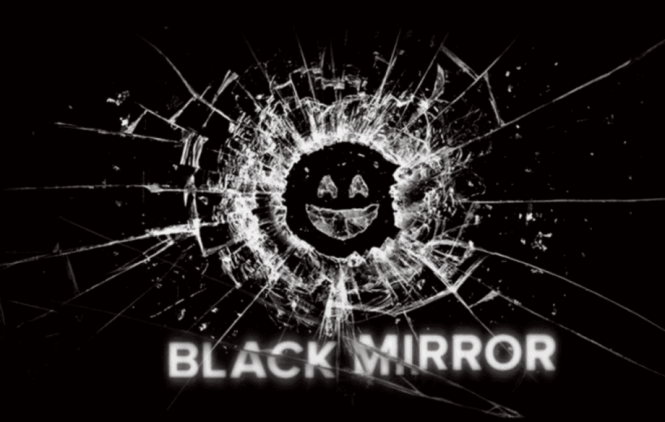Another year, another season of Black Mirror to try to scare us into throwing out our smartphones. Perhaps the show has realized this isn’t going to happen anytime soon, so this season takes a route more along the lines of “fine, keep your phones, but put them down every once in a while, will you?” As per tradition, both Sara and Andrew reviewed the newest season together. Wanted an extra opinion on whether or not to watch? Well, now you’ll have two! Everybody wins.
Season five of Black Mirror switches back to a three-episode season. In all likelihood, creator Charlie Brooker made this choice in order to put more effort into each episode. And it does show. Each episode this season is just over an hour, and has a premise that is tightly packed with material while still leaving you wanting more. Surprisingly, season five is a more upbeat Black Mirror than its notoriously dour predecessors. Each episode tackles a different subject, yet the tones and themes of each hardly differ. This isn’t necessarily bad per se. Each episode has a lot of fun and deals with more contemporary issues, but the lack of variety may not please everyone. This time around, writers Andrew and Sara are going to give both their takes and scores per each episode.
Striking Vipers
Andrew: In “Striking Vipers,” two longtime male friends reconnect over a new VR street-fighter type game. One of them is married, the other single, but they quickly find that they can do more than just fight in the new game and their friendship gets some benefits. The cast stays committed to the material, and Pom Klementieff and Ludi Lin shine as the two online avatars. You wouldn’t think that Black Mirror would deliver a great recreation of Street Fighter, and yet it captures the visuals of the game and its action sequences perfectly. One of the issues with the current season is that it doesn’t delve too deep into the issues at hand. While “Striking Vipers” raises a lot of questions about love, sex, identity, and online personas, it ignores them until the last minute and then waves them away with an ending that somehow fixes everything.
Sara: I have to agree with Andrew in that Pom Klementieff and Ludi Lin are both stellar and make the episode very watchable. For me, however, the entire premise could have used a bit of workshopping. The idea of obsession, of finding something so good that you’ll do anything to have it, has Black Mirror written all over it. The episode makes the secrecy over the virtual affair feel important, due to worries about the wife and internalized homophobia, but ultimately it feels a little juvenile. It plays with the boundaries of what is and isn’t cheating but also the compromise that goes into a marriage. Still, there feels like a misstep in the plotting wherein the paranoia takes over and so little of the actual balancing act gets lost and causes it to drag on.
Andrew’s Score: 3 out of 5
Sara’s Score: 2 out of 5
Smithereens
Andrew: Don’t people look at their phones too much? That’s the central conceit of “Smithereens,” in which a man who works for a ride-share company takes an intern at a social media company hostage due to his gripes with it. Essentially the episode blends together two modern day trends, ride-sharing and social media apps, but doesn’t really have too much to say other than that people should exercise caution when using them. However, it does excel in its depictions of grief and the ways in which people rationalize their behavior and attempt to seek closure. For an episode that takes place primarily in a car, it does a great job of gradually building tension as the situation escalates. The script and the performers do a great job of humanizing characters that could easily have come off as repugnant.
Sara: What I love about this episode can be summed up in three words: Uncertainty and finality. Andrew Scott as the grieving driver-turned-criminal is absolutely stunning, you can’t keep your eyes off him as he desperately tries to maintain control. And when it all comes down to getting what he wants, the actual request is fascinating. The element of uncertainty from the end of the episode, and ultimate truth that none of it changed a damn thing, makes it feel like the most Black Mirror episode of the whole season. Still, there was nothing new about the technology, no unexpected twists or extreme situations to muddy up the situation. All in all, there’s a lot here to enjoy thanks to the great acting, well built tension and smart writing.
Andrew’s Score: 3.5 out of 5
Sara’s Score: 4 out of 5
Rachel, Jack, and Ashley Too
Andrew: In some ways, “Rachel, Jack, and Ashley Too” almost seems like a parody of Black Mirror rather than an episode of the show itself. Brain scans, robots, holograms, and artificial intelligence all feature in the episode, and yet it has a lot of fun with them rather than decrying their evils. The plot moves between two stories, that of sisters Rachel and Jack, and that of pop-star Ashley O. Eventually the stories converge, as Rachel gets a small AI robot modeled after the singer named Ashley Too. The first half of the episode takes some time to move things into place, but once it gets going it uses them for a lot of fun and humorous bits as it turns into an action-comedy. A self-deprecating Miley Cyrus plays Ashley (and Ashley Too), skewering her own persona once the AI robot reveals the real personality behind the singer’s squeaky-clean self-image.
Sara: The insidious aunt is probably one of the best villains in the show, not only because she’s willing to murder her niece once she’s bleed her dry creatively but because she’s not being influenced by technology. She was’t driven to badness, she was just a greedy, self-important asshole who will not be impeded. In the same vein, I love Rachel for being unapologetically dorky and lonely in that way that tweens are, where they try so hard to be liked and noticed. The episode itself is gorgeously shot and the design work on the Ashley Too is fantastic, moving very smoothly and with great emotion. Overall, the plot is very satisfying but I feel like there’s little resolution of the sisters’ tensions and loss which would have been nice.
Andrew Score: 4 out of 5
Sara’s Score: 4 out of 5
Summary
Overall, Black Mirror Season 5 was a strong effort but misses the mark of being great or particularly memorable. Strong writing, solid ideas, but none of that sharp, biting commentary that goes to dark places that made us all fall in love with it in the first place.





